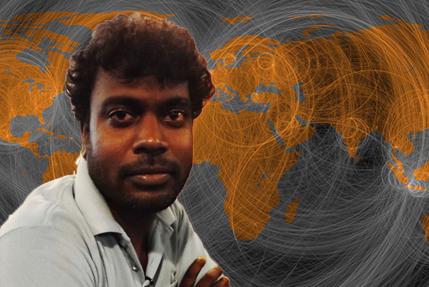"I am from there. I am from here. I am not there and I am not here. I have two names, which meet and part, and I have two languages. I forget which of them I dream in." Mahmud Darwish, Palestinian Poet
On June 20th, World Refugee Day, the United Nations announced that there are now 45 million people uprooted from their homes, primarily due to violence and war. Refugees are often adept at creating a cultural space on the private household level, but are typically challenged when it comes to creating public cultural spaces – often due to a lack of resources and unfamiliarity with the customs of their new host community.
As a cultural anthropologist and scholar on refugee studies, I find important value in the collaboration among the Liberian Women’s Chorus for Change artists, Philadelphia Folklore Project professional staff, and Roadside Theater because the collaboration recognizes the fundamental need for those attempting to create a new home to have communal opportunities to experience their cultural traditions through artistic expression – and to share those expressions publically with their new neighbors.
Non-commercial artists, generally, in the U.S. face challenges because of the current prevalence of market values in all aspects of American life – whereas the majority of refugee artists come from cultures where art is seldom regarded as a commodity. Rather, art is an important part of everyday life, and experienced as a most powerful way to document the past, tell about the present, and construct the future. Art is seen as social capital. It is individual and communal therapy. It relives pain and suffering but also creates happiness, community, and belonging. It is a tool for social mobilization, and an instrument of social change. Most of the world recognizes that art contributes to the overall spiritual, emotional, and intellectual well-being of people and their communities. Its economic role is secondary, at best.
I consider the Women’s Chorus or Change project to be a theoretical contribution to social change for those who have left their homeland. Host nations and host communities too often perceive and treat those from other countries as passive, helpless subjects coming from abject poverty with no knowledge, skills, and tradition – a group of people who need to be saved. In addition, there is a stereotypical idea that food, shelter, and clothing alone are sufficient for refugees to live happy and productive lives.
Partnerships can be empowering, and Women’s Chorus for Change has all the promise of continuing to bring new awareness to those in Philadelphia – and even in Liberia – about the fundamental role of culture in creating individual and group identity, in fostering respect for difference, and in celebrating our common humanity across lines that seek to divide us.
Sasikumar Balasundaram is originally from Sri Lanka, a country devastated by three decades of civil war and violence. He received his PhD in Anthropology from the University of South Carolina. His doctoral dissertation is entitled “Freedom from Camps: Housing and Power in the Experience of Long-term Sri Lankan Refugees in India.” He is currently a post-doctoral scholar at the University of Kentucky's Appalachian Center, and teaches classes on refugees and humanitarian aid.
